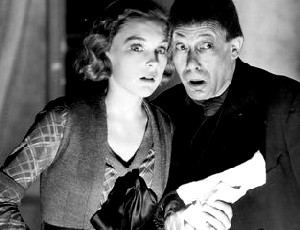Originally entitled by Cornell Woolrich "A Penny for Your Thoughts," the story "The Penny-a-Worder" was intended by the author for his disappointingly-received mainstream novel Hotel Room (1958) (see Francis M. Nevins' introduction to the story in Tonight, Somewhere in New York). However, it was originally published in Ellery Queen's Mystery Magazine in 1958 and was later collected in a book, Nightwebs, three years after Woolrich's death in 1968. It was not reprinted until 2005, in Tonight, Somewhere in New York ("Murder, Obliquely," reviewed here last year, also appears in this collection).
New York is a completist's collection, including disconnected fragments of an unfinished Woolrich novel as well as two chapters from Woolrich's autobiography, Blues of a Lifetime, which currently is available in paperback from Popular Press and much recommended by The Passing Tramp. But if you want to read just "The Penny-a-Worder" and you have a Kindle reader you can simply download it from Amazon for 99 cents. The story surely is worth at least 99 pennies!
This is a rich story, brimming not only with suspense, but with colorful observations about hotels and, especially, the craft of pulp crime fiction writing, from one of the greats in the biz, who wrote scores of short stories and novelettes in the 1930s and 1940s--far too many of which, incidentally, remain uncollected.*
*(Why has Woolrich not been more fully embraced by the august Library of America? Only Woolrich's 1948 novel I Married a Dead Man has been reprinted by LOA, along with five other works by different authors, in the volume American Noir of the 1930s and 1940s)
Woolrich's "Penny" is thematically similar to Joel Townsley Rogers' wonderful novelette "Killing Time" (1947), which I reviewed here. The two tales are the best fictional pieces I have read about the creative process of writing pulp crime fiction.
As Alfred Jan has noted in his introduction to a modern Rogers fiction collection including "Killing Time" has noted, there is an odd connection between these two stories. Note this passage from Woolrich's "Penny":
[The magazine's] title was Startling Stories!--complete with exclamation point. Joe [a ingenuous bellhop aspiring to be a writer] wiped his fingertips reverently against his uniform before touching it, as though afraid of defiling it.
Moody opened it for him, offered it to him that way. "Here I am, here," he said. "Second story. Next month I'm going to be the lead story, going to open the book on account of doing the cover story." He harked back to his humble beginnings for an indulgent moment. "When I first began, I used to be all the way in the back of the book. You know, where the muscle-building ads are."
"'Killing Time, by Dan Moody,' " Joe mouthed softly, like someone pronouncing a litany.
"They always change your titles on them, I don't know why." Moody complained fretfully. "My own title for that one was 'Out of the Mouths of Guns.' Don't you think that's better?"
It's hard for me to believe Woolrich hadn't read Rogers' novelette! But the plot of "Penny" goes in a different place. It's not even a real crime story, in that there's no crime in the story. But it's a wonderful portrait of the pulp fiction writer at work (there's even a clever nod to a certain story by Edgar Allan Poe, by the way). Is the ending tragic or comic? You decide.


Thanks for the tip! I will download this on my Kindle. I love Woolrich!
ReplyDelete